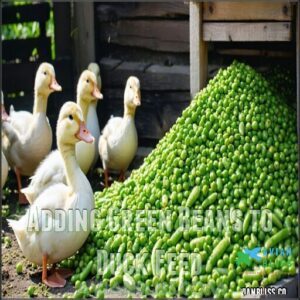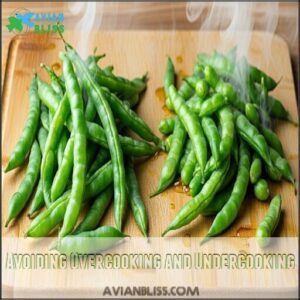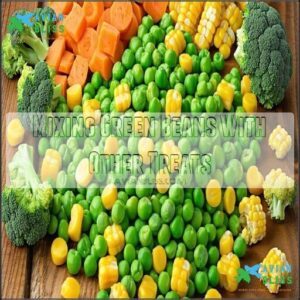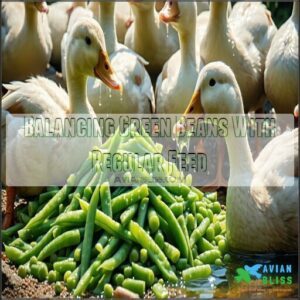This site is supported by our readers. We may earn a commission, at no cost to you, if you purchase through links.
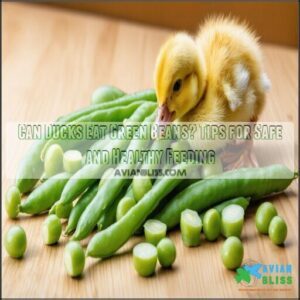
Green beans are packed with vitamins like C and B6, plus minerals such as calcium and iron, which support strong bones and overall health.
However, raw or dried beans can harm ducks due to harmful lectins, so it’s best to steam or boil them first.
Slice the beans into small pieces to prevent choking, and serve them as an occasional snack alongside their regular feed.
Remember, variety is key to a balanced diet, so don’t rely only on green beans. Ducks deserve a little flavor too!
Table Of Contents
Key Takeaways
- Always cook green beans by steaming or boiling to remove harmful toxins before feeding them to ducks.
- Slice green beans into small, easy-to-eat pieces to avoid choking hazards, especially for ducklings.
- Treat green beans as an occasional snack, limiting them to no more than 10% of the duck’s diet.
- Balance green beans with other safe foods like grains, leafy greens, and duck feed to ensure proper nutrition.
Nutritional Benefits of Green Beans
Green beans are packed with essential nutrients that support your ducks’ overall health, including vitamins, minerals, and antioxidants.
Green beans are a tasty, nutrient-packed snack that keeps ducks healthy, hydrated, and thriving year-round!
They can promote healthy digestion, strong bones, and vibrant feathers when added to their diet in moderation. Complete concepts
Hydration and Digestive Health
Green beans are a hydration powerhouse for your ducks! Packed with over 90% water, they help keep your feathered buddies refreshed and their digestion on point.
If you’ve wondered whether ducks eat green beans, the answer is yes—provided they’re cooked.
Here’s how green beans boost digestive health:
- Fiber Benefits: Green beans support bean digestion by promoting smooth bowel movements and reducing diarrhea risk.
- Water Content: They naturally replenish fluids, helping your ducks stay active and hydrated.
- Balanced Gut: Green beans nourish good bacteria, keeping your duck’s digestive system thriving (and reducing duck farts!).
Always cook green beans first to eliminate toxins. When properly prepared as part of a balanced duck diet, green beans for ducks improve hydration, digestion, and overall health.
Vitamins and Minerals in Green Beans
Packed with essential vitamins and minerals, green beans are a smart addition to your duck’s nutrition plan.
Rich in vitamin A, they sharpen eyesight and strengthen the immune system. Vitamin K is a key player in blood clotting and bone health, while calcium supports growing bones and promotes strong eggshells.
Iron in green beans enhances oxygen transport throughout your duck’s body, boosting energy levels. They also provide folate, which aids healthy growth and development—especially important for younger ducks.
Cooking green beans properly improves mineral absorption, ensuring your ducks reap the full benefits. Just remember, green beans for ducks should complement their diet, not replace it. Enjoy watching your feathered friends thrive with these green bean benefits! Moderation works wonders.
Antioxidant Properties
When you feed green beans to ducks, you’re giving them antioxidants that play a key role in their overall health.
Antioxidants protect duck cells against free radicals, supporting cellular protection and keeping your ducks healthy and energized.
Here’s how green beans boost your duck’s well-being:
- Cellular Protection: Antioxidants shield cells, reducing oxidative stress and damage.
- Immune Boost: Vitamin C improves immune function, warding off illness.
- Improved Health: Green bean benefits include enhanced metabolism and nutrient absorption.
By incorporating green beans into their diet, you’re not just feeding them—you’re strengthening their health inside and out.
Weight Management
A healthy duck starts with calorie control and portion sizes.
Green beans are low-calorie and nutrient-packed, making them ideal for obesity prevention. They’re a great choice for healthy duck treats, helping keep your ducks active and fit.
Combine green beans with a balanced diet and plenty of exercise to manage weight effectively. Always monitor portion sizes to guarantee your feathered friends stay happy, energetic, and full of life.
Support for Healthy Feathers and Beaks
Adding green beans to your ducks’ diet is a smart way to support their health.
These veggies are packed with nutrients that strengthen feathers, enhance beaks, and keep your ducks looking their best.
During molting, green beans for ducks provide essential vitamins that aid feather development and nutrient absorption.
- Support robust beak strength for easier foraging.
- Enhance feather structure, promoting natural shine and softness.
- Boost molting support, helping regrowth stay smooth and efficient.
- Improve duck nutrition with a low-calorie, nutrient-packed treat.
- Promote a balanced diet, ensuring ducks thrive year-round.
Green beans can truly be healthy duck treats, combining tasty nutrition with practical benefits for exceptional duck health.
Risks of Feeding Green Beans to Ducks
Feeding green beans to ducks can come with risks if they’re not prepared correctly. Raw or undercooked beans, choking hazards, and overfeeding can harm your ducks’ health.
Lectins and Their Toxic Effects
Lectins, found in raw green beans, are toxic foods that can disrupt digestion and block nutrient absorption in ducks.
These plant proteins, particularly phytohaemagglutinin, make raw or uncooked beans harmful, potentially causing digestive upset.
Cooking neutralization is essential—boil or steam green beans thoroughly to guarantee safe consumption.
Always avoid feeding raw beans to ducks to prevent serious health risks.
Choking Hazards From Raw Green Beans
Raw green beans can cause trouble for ducks since they gulp their food whole, not chewing like we do.
Their firm texture and size increase the choking hazard, especially for ducklings with smaller throats and developing systems.
To keep green beans safe for ducks, preparation is key.
- Slice the beans into tiny, bite-sized pieces to avoid any risk of blockages.
Raw beans are tough and may block a duck’s digestive tract if swallowed whole.
Cooking softens them, making them easier to swallow. Always supervise feeding time to guarantee they eat comfortably.
By focusing on preparation importance and safe foods for ducks, you’re looking out for their health and happiness!
Overfeeding and Nutrient Imbalance
Overfeeding green beans to ducks can upset their delicate nutritional balance, leading to dietary dilution and health issues.
Ducks have specific dietary needs, and too many vegetables like green beans might replace essential nutrients from their primary feed. This could result in vitamin deficiency, mineral imbalance, or even protein excess, which harms their overall health.
You might notice weak feathers, sluggishness, or irregular droppings—clear signs of nutrient imbalance. Regular observation can help in recognizing bird malnutrition.
To avoid obesity risks, prioritize portion control: green beans should remain a treat, not the centerpiece of their diet. By following a balanced duck food list and keeping treats occasional, you’ll help maintain proper nutrition for your ducks while keeping them happy and healthy.
Interference With Regular Duck Feed
A duck’s love for treats like green beans can disrupt their normal eating habits if not managed carefully.
When green beans for ducks are overfed, it can lead to Nutrient Dilution and a Dietary Imbalance, as they might prefer these tasty veggies over their primary feed. This behavior, known as Feed Replacement, lowers their intake of essential nutrients found in specialized duck food.
Ducks rely on a balanced diet for proper growth, egg production, and overall well-being. Overindulging them disrupts this balance, much like skipping a nutritious meal for dessert.
- Tip: Keep green beans as a treat, making up no more than 10-15% of the total duck food list to prevent Reduced Intake of their main diet and avoid Behavioral Changes from overfeeding fun snacks.
Potential Allergic Reactions
Introducing green beans to your ducks’ diet might ruffle a few feathers if allergies appear.
Watch for reaction symptoms like sneezing, itchy skin, or digestive upset. Bean allergens can vary, and some breeds may show more sensitivity than others.
Here’s a quick guide:
| Symptom | Cause | Action | Prevention |
|---|---|---|---|
| Sneezing | Food sensitivity | Stop feeding green beans | Gradual introduction |
| Rashes | Skin irritation | Consult an avian vet | Monitor for safe food options |
| Diarrhea | Digestive upset | Offer fresh water, monitor diet | Introduce beans slowly |
| Lethargy | Immune response | Seek professional help | Avoid overfeeding |
If ducks eat green beans for the first time, introduce them gradually to minimize risk. Stay observant and prioritize safe foods.
Preparing Green Beans for Ducks
You need to cook green beans properly to make them safe for your ducks. Preparing them correctly guarantees they’re easy to eat and free from harmful toxins.
Cooking Methods to Neutralize Lectins
Worried about toxic lectins in green beans? Proper cooking methods make them safe for ducks.
Use these techniques to neutralize harmful compounds:
- Boiling Time: Simmer green beans for 10–12 minutes to destroy phytohaemagglutinin while keeping nutrients intact.
- Pressure Cooking: A quick, efficient way to eliminate toxins and prepare nutritious cooked beans.
- Sprouting Beans: Reduces lectins naturally and boosts nutrient availability.
Stick to safe temperatures and prepare all beans properly. Avoid serving undercooked beans, as they can harm your ducks.
Master these methods, and your ducks will enjoy a healthy, tasty treat!
Steaming Vs. Boiling Green Beans
Cooking green beans for ducks? Let’s weigh the options—steaming or boiling. Both methods guarantee ducks safely munch on these nutritious veggies.
Steaming takes less time and energy, preserving nutrients and delivering crisp-tender beans.
Meanwhile, boiling softens the beans, making them easier for older ducks or those with sensitive beaks to eat.
Consider products for easier steaming to simplify the cooking process.
Here’s a quick comparison:
| Method | Nutrient Retention | Texture | Cooking Time |
|---|---|---|---|
| Steaming | High | Slight crunch | 5-7 minutes |
| Boiling | Moderate | Softer | 8-10 minutes |
Always cool the beans first to prevent burns. Whether you steam or boil, green beans remain a healthy and palatable treat that highlights why ducks can eat vegetables safely!
Adding Green Beans to Duck Feed
Once you’ve steamed or boiled your green beans, chop them into small, manageable pieces that are easier for your ducks to swallow.
Adding green beans to your ducks’ regular feed is simple—just mix them in as a healthy, fiber-rich treat. Remember, green beans for ducks are a nutritional bonus, not the main event, so keep portions moderate to avoid nutrient imbalances.
You can even create simple DIY feeders to offer the green beans.
Here’s how to incorporate green beans effectively:
- Use organic beans to minimize pesticide exposure.
- Try sprouted beans for added nutrients and easier digestion.
- Consider bean variety to keep mealtime interesting for your ducks.
Bean supplementation works best when balanced with high-quality duck feed, so don’t skip the staples.
Serving Green Beans as Treats
When feeding ducks, green beans transform into a delightful treat with the right preparation.
To keep your ducks happy and safe, follow these steps for serving green beans as wholesome snacks:
- Safe Preparation: Always cook green beans thoroughly, chop them into small, duck-friendly pieces, and avoid adding seasoning.
- Portion Control: Limit treats to ½ cup per duck, offering them 2-3 times weekly to maintain a balanced diet.
- Treat Variety: Mix green beans with other vegetables, like peas or carrots, to enhance nutrition and keep meals exciting.
Consider supplementing their diet with nutritious duck snacks for added health benefits.
Green beans for ducks should be served as occasional treats, never as their main food. By carefully preparing these vegetables, you’ll create enjoyable and healthy snacking moments for your feathered friends.
Avoiding Overcooking and Undercooking
Getting green beans for ducks just right is key. You’ll want to cook them for 5-7 minutes—long enough for toxin neutralization and nutrient retention but short enough to keep the right texture.
Soft, bright beans offer ideal digestibility impact. Undercook, and you risk poor digestion; overcook, and they lose their benefits.
Green beans should be slightly crisp but tender, a treat your ducks will enjoy. Proper cooking duration guarantees green beans are safe and healthy for feeding ducks.
Guidelines for Feeding Green Beans to Ducks
When feeding green beans to ducks, it’s essential to focus on proper preparation and portion sizes to guarantee their safety and health.
By balancing green beans with other foods and monitoring your ducks’ intake, you can provide a nutritious treat without disrupting their regular diet.
Quantity and Frequency of Green Beans
Portioning green beans right is essential for keeping your ducks happy and healthy. Ducks eat green beans safely when you stick to a controlled plan: about 1–2 tablespoons per duck, served 2–3 times weekly.
Treat green beans as a complement to their diet—a little boost, not the main course.
Overloading on treats, even nutritious ones, can upset a duck’s delicate dietary balance. Here’s why portion size matters:
- Supports balanced nutrition without pushing out essential foods.
- Prevents digestive issues caused by overindulgence.
- Keeps treats under 10% of the overall daily diet.
- Ensures variety to meet nutritional needs and encourage interest in meals.
- Helps monitor intake and maintain healthy body weight.
Adjusting regular feed alongside green bean treats guarantees your ducks stay strong and energetic. Remember: moderation is the secret to making green beans a safe, healthy addition to their weekly menu!
Age and Health Considerations
As ducks grow, their nutritional needs shift, and green beans can be a small yet effective part of their diet.
Ducklings, for instance, require extra care when introducing new foods. Start with small amounts of cooked green beans after four weeks to support their delicate systems.
Senior ducks may benefit too, but their digestion can slow with age. Focus on softer, well-cooked beans to guarantee easy digestion while monitoring for any signs of discomfort or allergic reactions.
Health monitoring is key when feeding ducks green beans. Keep an eye on their overall condition and droppings to detect issues early.
- Duckling introduction: Begin after four weeks.
- Cooked beans only: Never feed raw beans.
- Monitor reactions: Watch for allergies.
- Balance their diet: Prioritize core feed.
Mixing Green Beans With Other Treats
Green beans can be a delightful addition to your ducks’ treats when paired with other safe foods.
Creating diverse and balanced treat combos keeps mealtime exciting and guarantees your feathered friends stay healthy. Ducks love variety, so consider these bean treat pairings:
- Mix steamed green beans with sweet corn and thawed peas for a colorful, crunchy snack.
- Toss chopped green beans with carrots and broccoli florets for a nutrient-packed mix.
- Combine warm green beans with cooked quinoa and small fruit pieces for balanced texture.
- Pair green beans with kale and squash chunks for seasonal variety.
Always follow safe treat ratios—treats, including green beans, should only make up about 10% of their diet.
Consider using premade duck treat mixes for added convenience. Supplementing commercial feed with these mixes creates a balanced treat variety while avoiding toxic mixes.
Plan ahead, prep in portions, and keep feeding your backyard ducks both safe and fun!
Monitoring Duck Health and Adjusting Diet
Pay attention to your ducks’ health by observing important cues like feather condition, energy levels, and egg production.
Droppings can also reveal how well their diet is working—look for consistency and color changes. Regular health checks are essential; monitor weight fluctuations by feeling their keel bone and adjusting their diet if necessary.
If behavior changes, like lethargy or reduced activity, appear after feeding green beans, reassess portion sizes or frequency. Ducks communicate their nutritional needs through these signs, so stay attentive.
Safe foods for ducks, like vegetables, should support overall duck care while promoting health and well-being. Be aware that labored breathing symptoms can indicate respiratory distress.
Balancing Green Beans With Regular Feed
Balancing green beans with regular feed guarantees your ducks get the right nutrition without overloading on treats.
It’s important to treat green beans like a side dish; they’re nutritious but shouldn’t dominate their diet.
Supplementing feed effectively requires portion control and variety.
Use these tips:
- Stick to 10%: Limit green beans to no more than 10% of your ducks’ daily intake to avoid upsetting their nutritional needs.
- Pair wisely: Combine green beans with regular duck feed, like pellets or grains, to maintain dietary diversity.
Treat frequency matters—offer green beans just a few times weekly.
With mindful feeding, green beans enhance your flock’s health while keeping meals balanced and wholesome.
Common Mistakes to Avoid When Feeding Green Beans
Feeding ducks green beans can be healthy, but common mistakes like serving them raw or in large amounts can cause harm.
To maintain their health, prepare and portion them properly while keeping an eye on your ducks’ overall diet and health.
Feeding Raw or Undercooked Green Beans
Serving green beans to ducks can be nutritious, but raw or uncooked beans are a no-go. Raw Bean Toxicity is a real threat due to phytohaemagglutinin, a harmful compound that can cause Lectin Poisoning.
This toxin wreaks havoc on a duck’s digestive system, leading to symptoms like vomiting, Digestive Upset Signs, or lethargy.
Cooking time matters. Always soak beans for at least five hours and boil them thoroughly to neutralize these toxins. Steaming works too, as long as the beans are cooked until tender, ensuring nutrients remain intact.
If you’re in a pinch, consider Safe Bean Alternatives like frozen green beans—just boil them first. Avoid offering raw beans and keep your ducks safe with properly prepared treats. A little extra preparation today means healthier, happier birds tomorrow!
Overfeeding and Causing Nutrient Imbalance
Feeding ducks is all about balance, but overloading green beans into their diet creates trouble.
Too many green beans dilute dietary diversity, leading to vitamin deficiencies, mineral imbalances, and even growth problems. Ducks need more than just veggies to thrive—protein, grains, and specialized feed play key roles.
Overfeeding green beans can cause digestive discomfort, poor feather quality, and reduced egg production. A varied diet is key to preventing bird malnutrition. Keep these nutritious treats at no more than 10% of their daily intake.
- Nutrient gaps from unbalanced meals stunt healthy growth.
- Overeating green beans crowds out essential foods.
- Digestive turmoil disrupts their routine.
- Feather growth suffers without key nutrients.
- Health risks grow with a narrowed diet.
Moderation guarantees happy, healthy ducks.
Not Providing Enough Fresh Water
Ensuring proper water intake is just as essential as asking, “Can ducks eat vegetables safely?” When feeding green beans, fresh water access is a must.
Ducks can’t properly digest food, including green beans, without clean water to help them swallow and process nutrients. Keep multiple bowls of clean, cool water nearby, replenishing them daily to maintain water quality.
Stagnant or dirty water risks contamination, which might negate the benefits of green beans. Watch for dehydration signs like lethargy or dry feathers—ducks need regular hydration to stay healthy.
Remember, feeding ducks green beans is safe, but without clean water, the risk of health issues increases substantially, and it is crucial to provide clean water to prevent dehydration.
Not Monitoring Duck Health and Adjusting Diet
Good health starts with observation.
When feeding backyard ducks green beans or other vegetables, monitor their health closely. Regular checks help you spot issues like dull feathers, unusual weight changes, or a lack of appetite.
Watch for shifts in behavior after dietary adjustments—symptom observation is key. If something seems off, consult an avian vet to fine-tune portion control and guarantee dietary variety.
Ducks thrive with balance, so look for early signs of trouble. Consistent health monitoring and diet adjustment keep your flock happy, answering the question: can ducks eat vegetables safely? Absolutely!
Not Providing a Balanced and Varied Diet
A varied diet is essential for your ducks’ nutrition and overall health.
Relying too much on a single food, like green beans, can cause dietary imbalances, nutritional deficiencies, and growth problems.
Ducks thrive on diverse meals that support strong immunity, vibrant feathers, and good egg quality.
- Include a mix: Offer cooked grains, leafy greens, proteins like mealworms, and a variety of vegetables to boost health and nutrition.
By rotating foods, you’re giving them the nutrients they need for ideal energy and healthy feeding habits every day.
Frequently Asked Questions (FAQs)
Can ducks eat beans?
Beans are packed with protein, essential for growth and energy.
Ducks can eat cooked beans in moderation, but skip raw ones—they’re toxic.
Chop them small and introduce gradually to avoid digestive issues. Balance their diet.
Are green beans good for ducks?
Green beans are great for ducks when properly prepared.
They’re packed with vitamins like A, C, and K, plus fiber and antioxidants.
Just cook them, chop into small pieces, and avoid raw beans to keep ducks safe.
Can ducks eat vegetables everyday?
Yes, ducks can eat vegetables daily, but balance is key.
Include a variety of safe vegetables like leafy greens, cucumbers, and peas.
Always wash, chop, and avoid overfeeding to keep their diet nutritious and healthy.
Can ducks eat too many green peas?
Imagine watching your ducks happily gobble up green peas, only to notice digestive issues later.
Too many green peas can cause bloating or diarrhea.
Feed them sparingly, balancing their diet with variety and moderation.
Can ducks eat bean sprouts?
Ducks can eat bean sprouts if they’re fresh, washed, and free of seasoning.
Chop them into small pieces to guarantee easy swallowing.
Introduce sprouts gradually and watch for reactions to avoid any digestive upset.
Can ducks eat lima beans?
Feeding lima beans to ducks is risky unless cooked.
Raw lima beans contain toxins harmful to birds.
Boil thoroughly to neutralize toxins, chop into small pieces, and offer sparingly alongside diverse, nutrient-rich foods for balance.
Can ducks eat green bean?
Green beans are a nutritious treat for ducks when cooked and cut into small pieces.
They’re packed with vitamins and minerals, but avoid raw or undercooked ones since they contain toxins harmful to birds.
Can ducks eat uncooked beans?
You shouldn’t feed raw beans to ducks because they contain phytohaemagglutinin, a toxin that can make them very sick.
Always cook beans thoroughly before serving to neutralize toxins and guarantee they’re safe to eat.
What vegetables do ducks eat?
You can offer ducks leafy greens like kale, spinach (in moderation), and romaine, along with veggies such as zucchini, peas, carrots, and bell peppers.
Always chop them small and avoid toxic foods like avocado.
Can ducks eat green beans raw?
Raw green beans aren’t safe for ducks because they contain toxins that can make them sick.
Always cook green beans thoroughly, chop them into small pieces, and serve them as a healthy, occasional treat.
Conclusion
Did you know green beans are 90% water, making them a hydrating treat for ducks?
Ducks can eat green beans safely when prepared properly—just steam or boil them to remove harmful lectins, then slice into smaller pieces.
Remember, though, green beans should only be an occasional snack, not a replacement for their regular feed.
Providing a varied diet helps keep your ducks healthy and happy. So, prepare those green beans right and enjoy watching your ducks thrive!





